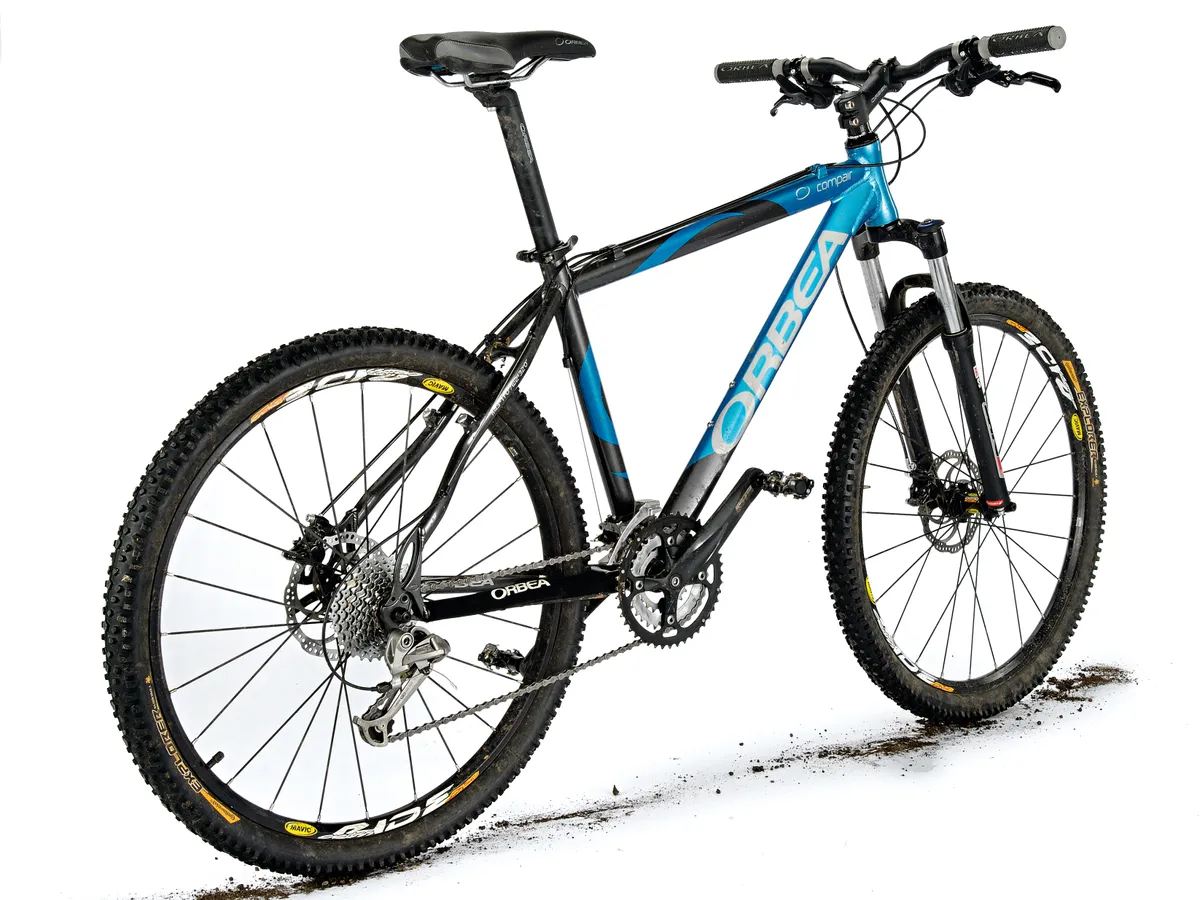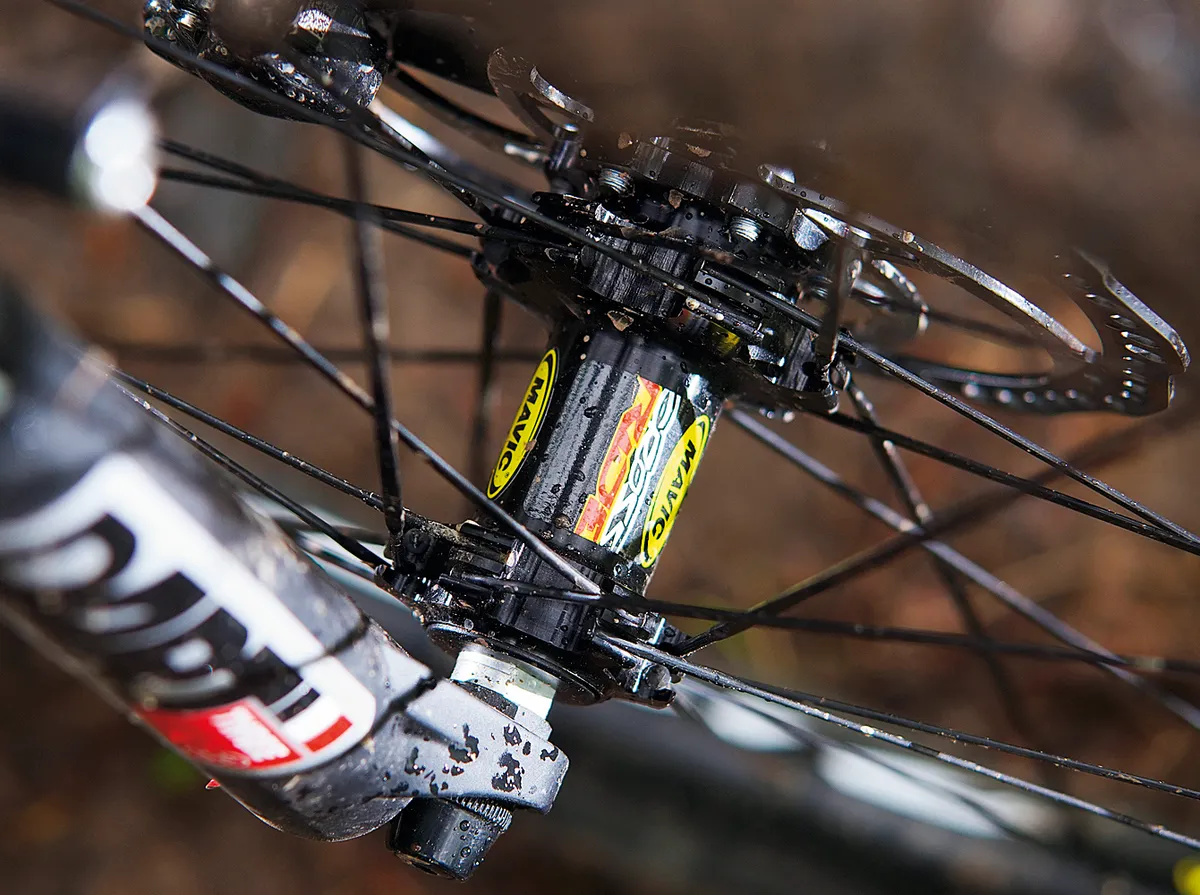This Spanish hardtail has a lot of promise as a cross-country race machine, but it's badly let down by an unbalanced spec that puts wheels ahead of fork performance.
You may not have seen many Orbeas out on the trails (yet) but this Pyrenean-based bike company is a big name in both road and mountain bike racing, both in Spain and throughout Europe. The Lanza series of aluminium hardtails props up the middle of Orbea's extensive hardtail range, and the Compair is the entry-level model. Boasting a trick-looking Mavic wheelset and a respectable all-up weight under 27.5 pounds, the question is whether it can deliver out on the race course.
Frame & fork
Once you've become used to all the multi-profiled, ultra-clever tubesets that adorn increasing numbers of aluminium-framed bikes these days, it's quite refreshing to discover a frame that doesn't pull any punches. The Compair's main triangle is noticeably devoid of flared, shaped, bent or otherwise manipulated tubes. A coffin-profiled down tube with a large, open-ended gusset at the junction with the smoothly butted head tube is paired with a comparatively slender top tube. And that's it.
Providing an anchoring point for the rear wheel is a set of flamboyantly curved stays, which in turn flow into a pair of dropouts that wouldn't look out of place in a sculpture exhibition. The smooth lines are spoilt somewhat by the redundant front and rear brake bosses - you wouldn't be able to run rim brakes with the supplied wheels even if you wanted to. While we're grumbling, neither the over-tight fit of the seat post in our test frame, nor the fact that both frame badges were falling off when the bike reached us, are the kind of details likely to impress the owner of a brand new £800 bike. Still, the rest of it looks well put together, though.
Plugged into the head tube is a fork that simply doesn't belong on an £800 bike - the RockShox Dart 3. We've seen large sample variations with this budget unit this year and, although the spec appears to tick all the right boxes - 100mm travel, adjustable rebound and compression damping - the reality doesn't live up to the promise. Our test sample proved to be the most troublesome we've seen so far. We never managed to coax more than 30 of the supposedly 100mm of available travel from it - and that was by throwing the bike down the rockiest descent we could find.
The rebound adjustment allowed us to tweak between merely slow and positively glacial. And, just to add insult to injury, the rebound adjuster knob fell off into the undergrowth ten minutes into our first ride.
Equipment
The culprit for the low-rent fork is, we suspect, the rather attractive-looking Mavic wheelset. Not being bike industry product managers, we can't say for certain whether this is a more expensive speccing choice than the Shimano M475 hubset/generic rim combo that graces most bikes in this price bracket, but it's a fairly safe bet that that's the case. And the fork isn't the only casualty. The down-specced rear mech and chainset don't affect function, but they won't earn the Compair any bragging rights on the start line. It's good that the Formula brakes are such excellent performers, with great gobs of power and the kind of modulation we don't normally expect from a budget brake.
Ride
It'll be obvious by now that the Compair's fork is a serious let down, so let's concentrate on the good bits. A short stem bucks the tendency for cross country race bikes to shoehorn in extra cockpit room by forcing the rider's weight forward. Combined with a roomy top tube, it gives the Compair a tight, manoeuvrable feel that's up with the best-handling hardtails. The front can unweight a tad on the steepest climbs, but it's easy to compensate for, and the payback is a hard-wired immediacy to the steering that's positively inspiring on fast-changing trails.
Throw in the lowish overall weight and a frame that balances efficiency and comfort very effectively, and it's easy to find yourself lost in the moment, turning the gears a sprocket higher than usual and enjoying every minute. Well, nearly every minute. Because as soon as you hit the first section of choppy braking bumps, washed-out roots or babyhead rocks, you'll be wishing you had a fork that actually worked. Which is roughly where we came in.
Conclusion
Let's cut to the chase: this is potentially a great-handling bike, but it's almost ruined by some daft speccing decisions. Wheels don't win races, but a fork that works makes a real difference on a course that's fast, rough or both. It's not rocket science, but Orbea's designers appear to have been blinded by the bling value of a nice set of hoops. Given that you'd have to replace the fork from scratch - and even then you'd be stuck with a below-par transmission for the money - it's hard to recommend this bike.

